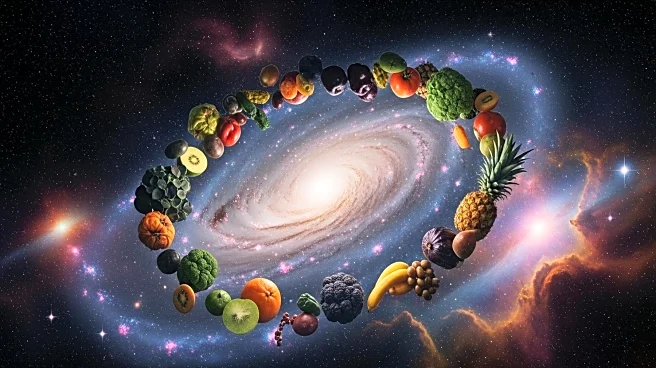What's Happening?
Recent advancements in food science have introduced the concept of 'nutritional dark matter,' highlighting the vast array of unstudied compounds in food that may significantly impact human health. Hungarian-American physicist Albert-László Barabási coined the term, drawing parallels to universal dark matter. Current nutritional databases track only 150 of over 26,000 food compounds, leaving a majority uncharted. This revelation suggests that poor nutrition is responsible for one in five adult deaths globally. The emerging field of 'foodomics' aims to understand how diet interacts with genes, microbes, and disease mechanisms, potentially reshaping future food innovation. Scientists are working to catalog these hidden compounds, linking them to human proteins, gut microbes, and disease processes.
Why It's Important?
The exploration of nutritional dark matter could revolutionize the food industry by transforming product development and personalized nutrition. Understanding the hidden biochemistry of food may lead to the creation of functional foods and microbiome-friendly formulations, moving beyond reductionist approaches. This could result in foods that are not only nourishing but actively health-promoting, tailored to individual needs. The food industry faces both challenges and opportunities as it adapts to these scientific advancements, potentially leading to healthier populations and reduced healthcare costs.
What's Next?
The Foodome Project is actively cataloging food compounds, with over 130,000 molecules already listed. As research progresses, scientists hope to answer questions about diet efficacy, disease prevention, and the development of new drugs or foods. The food industry may need to rethink product formulations, considering bioactive compounds and their interactions with the human body. This shift could lead to a future where food is tailored to individual health needs, backed by deeper scientific insight.
Beyond the Headlines
The ethical implications of nutritional dark matter research include the potential for more equitable access to health-promoting foods. As science uncovers the complex interactions between diet and health, there may be a push for transparency in food labeling and marketing. Additionally, cultural shifts could occur as societies embrace diets rich in uncharted compounds, potentially altering traditional eating habits.











